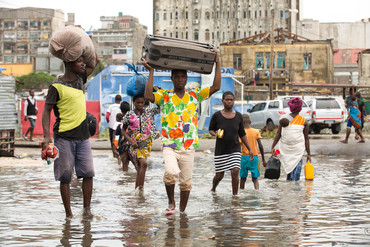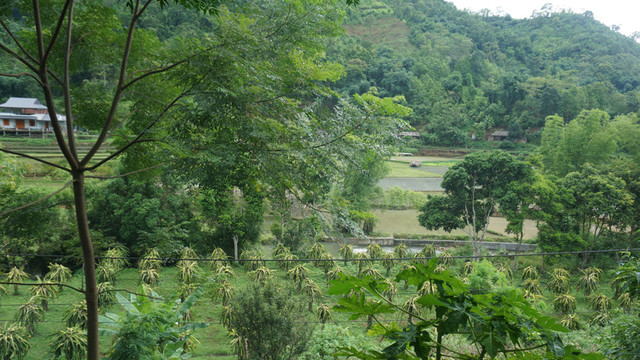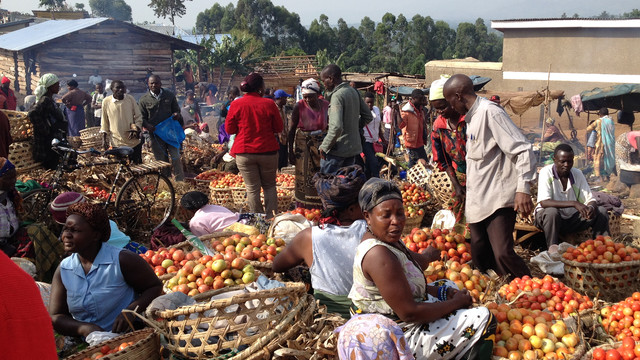The non-economic impacts of loss and damage: destroying the spirit, breaking the soul
The discourse on loss and damage largely centres around the ‘economic’ impacts of climate change. But non-economic impacts − from the strain on social bonds to debt-induced anxiety − are equally devastating. Research using a methodology based on locally identified values sought to deepen understanding of these intangible losses and damages from climate change


A view of Shyamnagar in the southwestern Satkhira district. This is one of the areas of Bangladesh most vulnerable to climate change, due to salinity intrusion, drought and flooding. Climate-driven loss and damage extend beyond the economic, disrupting people’s religious and social wellbeing and threatening centuries-old customs (Photo: Fabeha Monir/Panos/IIED)
I belong to the small village of Durgapur Upazilla in north-central Bangladesh, where my father and my uncles are all small-scale farmers. I work as a researcher on climate change adaptation and loss and damage, but I do some farming myself too, helping out in particular in post-harvesting tasks.
As farmers, my family has direct experience of the loss and damage from climate change and it’s an issue very personal to me.
Flooding in our region has become a major problem. But floods are not new for us, and in fact they used to be beneficial. The flash floods that came from the hilly state of Meghalaya in India would bring sediment, important for enriching the soil. The dry period that followed the flood would also be crucial – this was when we would dry the rice.
But now floods bring three or four times the amount of rain. It inundates the land and ruins the crops. And the rain pattern has changed: when rain should come it does not, it rains when it is supposed to be dry. Sometimes, rains continue for weeks and weeks, so the rice never dries. The moisture turns the grains brown, and the rice begins to rot.
Our rice crops have failed now for consecutive years. My father, like so many villagers, has lost his life investments.
The economic impacts of crop losses are huge. But failing rice crops profoundly impacts people in other ways. These non-economic impacts aren’t well recognised or documented. They are not the physical devastation causes by floods or cyclones. They move silently through communities, breaking the soul of the people.
As harvests fail, emptiness follows
In our culture, the rice harvest is a very special time, and the village celebrates bringing in the crops with a festival. We make Pitha, a traditional cake made from rice flour. The Pitha is symbolic and central to this festival; we share the cake with relatives and neighbours. These celebrations nourish us in a spiritual way, it is a time for sharing and coming together.

Communities in Satkhira are trying to increase their cultivation of rice and move away from shrimp farming, which can damage the environment. Shrimp farms were previously pushed as an alternative for people whose rice crops could not grow in water and soil rendered saltier by climate-driven floods but, in a destructive feedback loop, this only added to salination issues. Gabura, Satkhira, Bangladesh (Photo: Fabeha Monir/Panos/IIED)
But because the harvests have failed, we haven’t celebrated for four or five years now. Households make less the Pitha. It leaves a deep sadness and emptiness in the village which is hard to put into words. We have nothing to celebrate, and there is nothing to bring the community together. It crushes the spirit of the people.
This is my experience from within my village. As part of our research to understand more about how climate change affects the aspects of climate people value most, we listened to people around Durgapur Upazilla.
It is significant that these stories come from north of Bangladesh as climate change research usually focuses on the south where the biggest cyclones tend to hit. Very little research is conducted in the central north; experiences there often go untold yet climate change touches everything we value.
Shattered home, broken heart
We spoke to a man called Rohit. He had worked all his life and with the money he had saved, he built a house for his family. In the 2022 floods, the family’s home was wiped out. In fifteen minutes it had been destroyed, leaving nothing but a hole, full of water. He described how he could only watch as the floods remove all traces of his home. He said he could not begin to describe the despair of this loss.
He and his family are now staying at a relative’s house, they have a room and beds. During the day Rohit works, and when he’s around people he can forget his sadness. But as night comes, he doesn’t want to go back to his relative’s house − it reminds him that he no longer has his home.
Nothing can compare to that feeling of being home. He explained how his wife has shut herself away. For weeks after losing their home she stopped talking completely. Now, almost a year on, she still barely speaks to anyone, and hardly eats. She says the only thing that can alleviate her sadness and stress is praying to Allah.
Spiritual loss
Another woman we spoke to was Hindu, like many people in my region. She was very religious. She explained how her worship rituals were so important to her and how she performed the worship of Puja to honour the goddess Durga. Many Hindu worships are linked to nature and Puja is performed with flowers and fruit. So she grew fruit trees and flowers around her home.
Now, with rising temperatures and drought, the flower blooms fall off quickly – or they do not bloom at all. Climate change is also affecting fruit production; previously she could offer up maybe 10 fruit during Puja, now she can offer only two.
With fewer flowers and fruit, she performs Puja much less. Puja is also performed with family and friends, and after offering up fruit to the goddess, they share fruit together.
She described a deep sadness in her heart as she can no longer pay proper respect to her goddess. She described an emptiness in not being able to practice Puja and share with others. She said the joy in her heart has gone.
Debt and depression
Another woman I spoke to was a very active worker; she had worked all her life. In earlier years she worked in a garment factory and, after she’d met her husband, moved to a village where they ran a small shop. At the same time, she did fish farming and kept ducks, chickens, goats and cows. She did all of this while running a household. Her motivation was to give her children the best life she could.
To get her businesses up and running the woman had taken a loan out from an NGO. It was a big loan, but with her experience and business knowledge she felt sure she would soon make a profit and be able to pay it back.
But a heavy flood came and destroyed her livelihood overnight. She lost her ducks and fish farming business. The floods brought water-borne diseases and sickness swept through her animals, killing many of them.
Now, unable to meet the loan payments, her debt is spiralling. She described deep anxiety and despair.
Despite working hard all her life to build herself a better life and give a good start to her children, they find themselves stuck in a cycle of intergenerational poverty. It is the biggest torment for her that she cannot not support her children. The stress of the debt has also taken a huge physical and mental toll on her husband, who has been hospitalised due to stress.
What do the people of Durgapur Upazilla want?
People in my region are not informed about climate change. They do not know why the weather is changing or what is to come. Sharing knowledge at this local level can better inform them of why the changes in climate are happening and what they should be prepared for.
But they cannot prepare for the future alone. They are already carrying the enormous burden of a problem they are not responsible for: they are already addressing losses and damages every day. The burdens will increase exponentially in the coming years as temperatures increase and rainfall patterns continue to change.
They told me they don’t want money or a new house: receiving goods is not helpful when every year all your belongings can be washed away.
Instead, they want increased protection from the impacts of climate change, and local job opportunities so they can stay with their families and enhance their economic stability − especially for women.
The national government can go some way to creating jobs, but the government, too, carries the burden of climate change while not being responsible for causing it. It is the world’s biggest carbon polluters that should help us and our government to support the people at the local level who are suffering the most.
During the three months I spent in Durgapur Upazilla, I found myself developing a strong emotional connection to people. Returning home, I sensed a weight of responsibility to share their stories resting upon my shoulder. Their words resonated in my head.
These people don’t want to live with these complexities, with this devastation, or with this deep sadness. Their needs and desire are simple – all they want is to live in a house, even if it’s a small house, with family, with food and in a society that’s in harmony.




